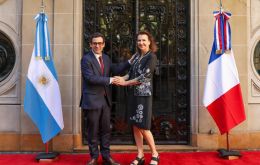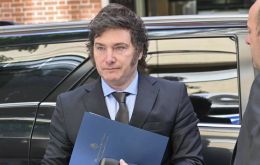MercoPress. South Atlantic News Agency
Tag: Luis Caputo
-
Monday, April 8th 2024 - 22:28 UTC
Argentina delays payments to IMF until April 30

The Argentine Government of President Javier Milei Monday decided to postpone maturities with the International Monetary Fund (IMF) worth US$ 1.94 billion until the end of this month. The move was within the provisions of the standing agreement between the South American country and the credit agency, it was explained in Buenos Aires.
-
Saturday, March 2nd 2024 - 10:57 UTC
Milei launches “May Pact” offer to governors in exchange for financial aid

Argentine President Javier Milei Friday announced he was summoning the governors of the 23 provinces plus the mayor of the Autonomous City of Buenos Aires as well as former heads of state and other political leaders to sign on the national May 25 holiday what he named “the May Pact,” a foundational agreement whereby the rules of the country's future would be laid out. He launched this appeal during his speech opening the 142nd Legislature.
-
Thursday, February 29th 2024 - 11:12 UTC
Argentina's Economy Minister meets with Georgieva in Brazil

Argentina's Luis 'Toto' Caputo and International Monetary Fund (IMF) Managing Director Kristalina Georgieva met Wednesday in Sao Paulo on the sides of the two-day G20 summit of Economy Ministers. The gathering took place less than a week after the visit to Buenos Aires of the IMF Managing Director Gita Gopinath, with whom Caputo and President Javier Milei discussed a new agreement on the South American country's debt.
-
Wednesday, February 21st 2024 - 16:12 UTC
French FM stops by in Buenos Aires ahead of Rio summit

Argentine President Javier Milei met in Buenos Aires Tuesday with France's Foreign Minister Stéphane Séjourné to strengthen bilateral ties and trade between the two countries.
-
Wednesday, February 21st 2024 - 10:45 UTC
IMF's Gopinath to hold key meetings in Buenos Aires

International Monetary Fund (IMF) Deputy Managing Director Gita Gopinath is due in Buenos Aires this week for meetings with President Javier Milei, Cabinet Chief Nicolás Posse, and Economy Minister Luis 'Toto' Caputo.
-
Saturday, February 17th 2024 - 10:34 UTC
Argentina achieves financial surplus for the first time in 12 years

The Argentine government of President Javier Milei announced Friday in Buenos Aires that the country had achieved a financial surplus for the first time in 12 years. In the first full month of the new administration, tax revenues grew by 256.9% which in addition to stringent cuts in public expenditure yielded these results, it was explained.
-
Thursday, February 1st 2024 - 10:15 UTC
Argentina: Fuel at pumps soars as gov't lifts taxation cap

Drivers lined up for hours Wednesday in Buenos Aires and other places across Argentina as a new increase in the price of fuel at pumps was expected to be enacted Thursday following a decision by the administration of President Javier Milei to release a liquid fuel (ICL) and carbon dioxide (IDC) tax cap in force since 2021, it was reported.
-
Saturday, January 27th 2024 - 10:59 UTC
Milei: Cabinet crisis, diplomatic clash with Colombia and Argentina “closer” to dollarization

While Argentine President Javier Milei said Friday that his country was closer to dollarizing its economy, Minister Luis 'Toto' Caputo announced that the taxation part of the so-called Omnibus Law bill was being spared for a later date in a move to have the legislation passed as soon as possible to achieve a zero deficit. However, the Chief of State's plans clash with other conflicts within the cabinet and also in diplomatic matters.
-
Thursday, January 11th 2024 - 11:20 UTC
Argentina gets fresh cash from IMF for impending maturities

The Argentine Government of President Javier Milei Wednesday reached an understanding with the International Monetary Fund (IMF) whereby the global credit agency will make a disbursement of nearly US$ 4.7 billion, Economy Minister Luis Toto Caputo confirmed during a press conference in Buenos Aires.
-
Monday, January 8th 2024 - 12:50 UTC
Milei praises Minister Caputo and says 30% monthly inflation would be ”a great achievement”

Argentine President Javier Milei praised Economy Minister Luis Toto Caputo for his management of the country's inflation for December 2023 and said that if it reached 30% it would be “a great number” because previous estimates spoke of 45%.
